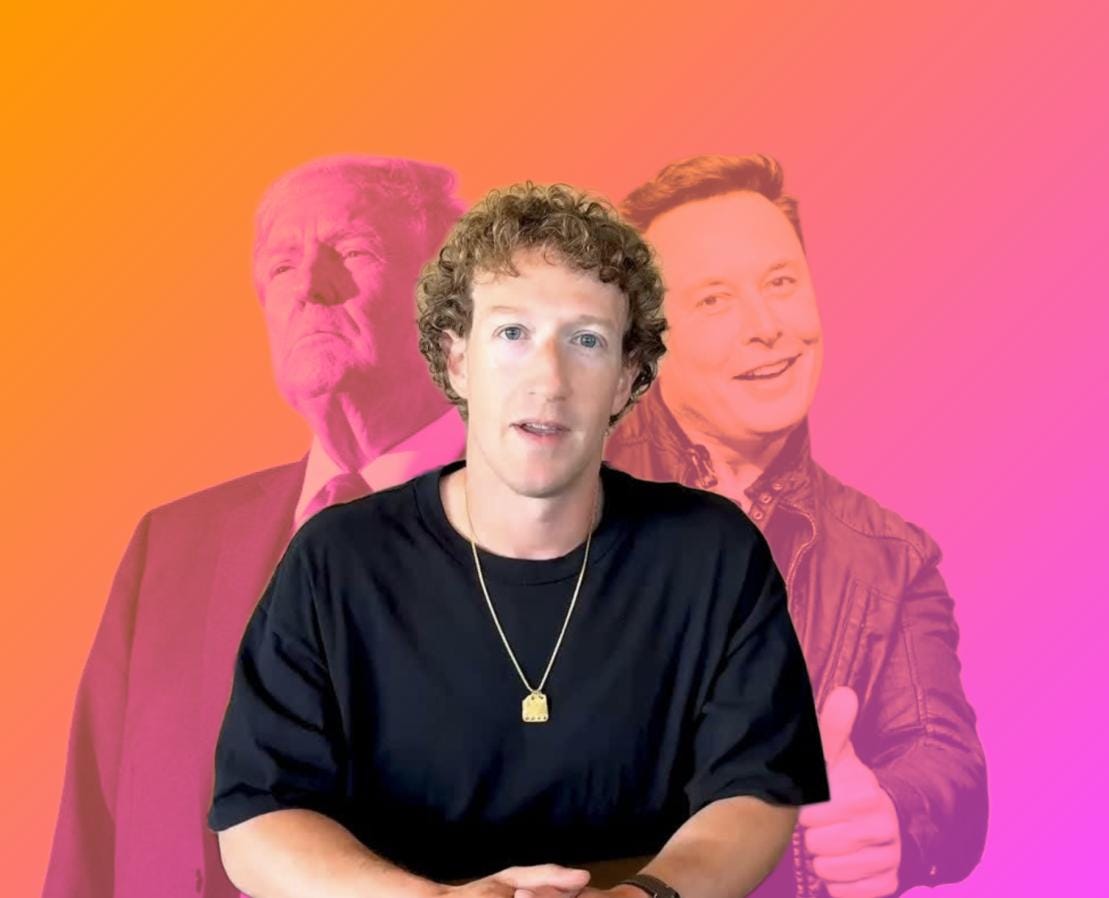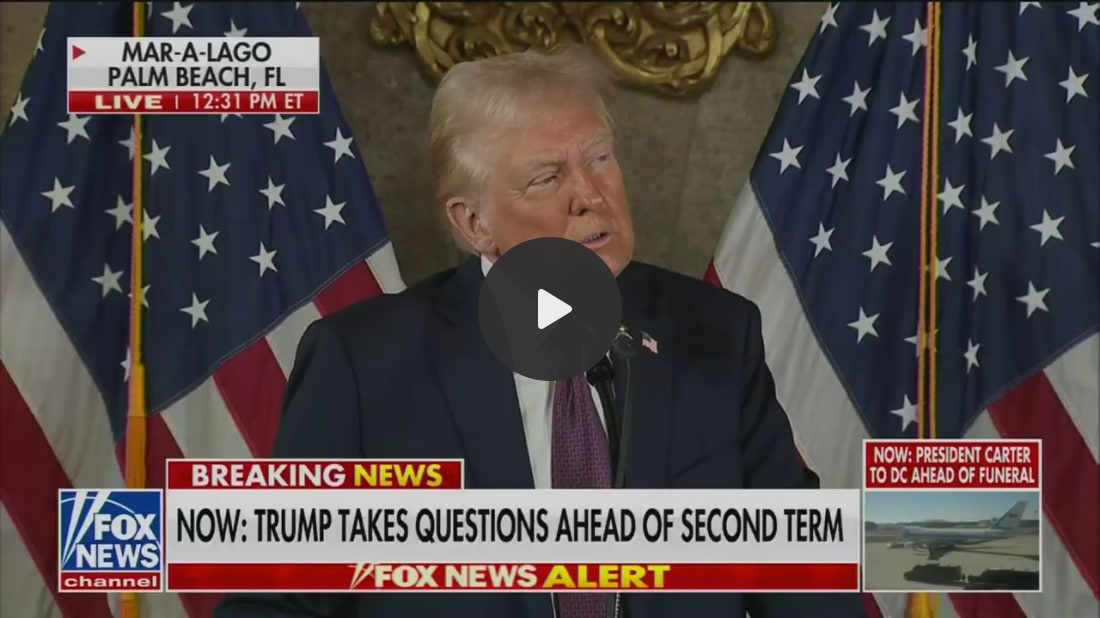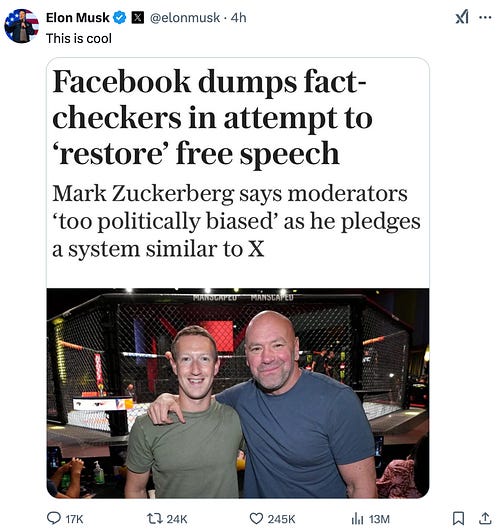Digital Diplomacy’s Substack, January 8, 2025
How Mark Zuckerberg's Move Will Impact Meta and Creators
Meta's announcement includes: removing fact-checkers; changes to political content; replacing Nick Clegg with Joel Kaplan, and adding Dana White to the Board.
💬 Quick CONVERSATION STARTERS:
So much to unpack about Meta
“The recent elections also feel like a cultural tipping point towards, once again, prioritizing speech. So we're gonna get back to our roots and focus on reducing mistakes, simplifying our policies and restoring free expression on our platforms.”
— Mark Zuckerberg
This is what Mark Zuckerberg, founder and CEO of Meta, has announced these past few days:
Starting in the US, Meta is ending our third party fact-checking program and moving to a Community Notes model — similar to Elon Musk’s X.
Meta will be lifting restrictions on some topics that are part of mainstream discourse and focusing our enforcement on illegal and high-severity violations.
Meta will take a more personalized approach to political content, so that people who want to see more of it in their feeds can.
Zuckerberg has named Joel Kaplan, a champion of conservative causes inside and outside Meta, as the company’s new Chief Global Affairs Officer — following the resignation of Nick Clegg, a former British deputy prime minister, after 6 years in the same role.
Zuckerberg has appointed Dana White, CEO of Ultimate Fighting Championship and one of Trump’s top endorsers, to Meta’s board of directors.
“These changes are an attempt to return to the commitment to free expression that Mark Zuckerberg set out in his Georgetown speech,” Kaplan commented Zuckerberg’s announcement. “That means being vigilant about the impact our policies and systems are having on people’s ability to make their voices heard, and having the humility to change our approach when we know we’re getting things wrong.”
Well, last year, we were asked by Lia Haberman, author of ICYMI by Lia Haberman, about our predictions for 2025… It was more of a wish list, but one of the two predictions was about Meta removing its de-facto recommendation ban on political content — the second was about TikTok not getting banned (we will see what happens there).
Donald Trump: “I think they come a long way, Meta, Facebook. I watched it — the man was very impressive.”
|
Elon Musk: “This is cool.”
Everybody has an opinion… Do you?
Let’s start by how Chris Best, co-founder and CEO of Substack, reacted:
I’m happy to see Mark Zuckerberg announce changes that support freedom of the press at Meta, in particular lifting the restrictions on discussing politics. These are good changes and I give him credit.
I’d love to see this grow into a principle stance that Meta commits to for the long term. He says they are making these changes because they hear what people are asking for, and because of the new administration. Even better would be to say these changes are the right thing to do, and that they won’t change back if the winds change again.
I hope that’s what we see. Creative freedom is essential for a free society.
Here how Substack creators are commenting:
Aaron Parnas wrote in The Parnas Perspective: “Mark Zuckerberg made a major announcement this morning: he is making Meta a carbon copy of Twitter.” He added: “As someone who believes in a genuine free press, I feel as though big tech companies and legacy media channels have failed us. It’s why I will continue to update you on here, and on my other social media platforms (yes even on Meta), because I believe that everyone deserves the unvarnished truth and that we have to play on every platform online, even on ones that aren’t friendly.”
Parker Molloy stated in The Present Age: “Make no mistake: this is a calculated business decision. Meta is fighting antitrust cases, hoping for government help against TikTok, seeking regulatory approval for various AI initiatives, and looking to curry favor with an administration that rewards loyalty.” She added: “The cynicism here is staggering. Meta isn't ‘returning to its roots’ — it's revealing them. They're not championing free expression; they're showing us exactly what kind of company they've always been: one that will embrace whatever ideology serves its bottom line.”
“Meta (née Facebook) is deep into a sustained campaign of capitulation to Donald Trump,” commented Jonathan V. Last in The Bulwark. He added: “We’re seeing this impulse to surrender across American society right now. Where the forces of authoritarianism never give up and never apologize, big chunks of liberal society are bargaining and capitulating without even trying to try to stay independent first.”
Mark Marshall wrote: “By reviving free speech Elon Musk and his X have done wonders, including paving the way for Zuck to change his ways. Really Elon may have saved free speech. But only one major social media platform being committed to free speech is a perilous situation. If Meta really does turn toward free speech and thereby makes that freedom more the norm again rather than the exception, that is great news for freedom and for the internet as a whole. And it makes it that much harder for the Globalists to cloak their predations. We owe Musk thanks for showing the way.”
Max Foster pointed out in a video: “Expect to see more harmful content on Instagram and Facebook — that’s not me saying it, it is the extraordinary claim from Mark Zuckerberg, who runs both of those platforms.” He added: “Mark Zuckerberg clearly trying to build bridges with Donald Trump before he gets into the White House.”
“I always retain no small amount of cynicism when a large corporate entity pivots in this manner,” wrote Stephen Knight in The Knight Report by Stephen Knight. “I suspect it's less likely a new found commitment to principle, but rather an adjustment based on what is now good for business.”
Other reactions:
X CEO Linda Yaccarino on X: “Fact-checking and moderation doesn't belong in the hands of a few select gatekeepers who can easily inject their bias into decisions. It's a democratic process that belongs in the hands of many.” She added: “And as we've seen on X since Community Notes debuted, it's profoundly successful while keeping freedom of speech sacred. It's a smart move by Zuck and something I expect other platforms will follow now that X has shown how powerful it is. Bravo!”
Jasmine Enberg at eMarketer wrote on LinkedIn: “Meta's new content moderation policies show just how far the company is willing to go to win Trump's approval ahead of the US president-elect's second term. It's a page out of Trump ally and X-owner Elon Musk's book. The move will elate conservatives, who’ve often criticized Meta for censoring speech, and spook many liberals and advertisers.”
Jennifer Kelly, General Manager and Vice President of Trust and Safety at Upwork, said on LinkedIn: “Mark Zuckerberg’s recent announcement about changes to Meta’s content moderation approach is raising eyebrows—and for good reason. These decisions appear to explicitly pander to political pressures, particularly from right-wing voices in the U.S., echoing a troubling trend we’ve seen elsewhere, most notably on Twitter/X.” She added: “Content moderation isn’t just a technical or operational challenge—it’s a moral and social imperative. Platforms like Meta hold immense power in shaping the digital public square. When they dilute their commitment to safety under the guise of ‘free expression’, they risk eroding trust, enabling harm, and silencing marginalized communities.”
Jeff Jarvis, professor at the Craig Newmark Graduate School of Journalism at CUNY, explained on Bluesky: “I won't defend Meta here but I have a contrarian view: Fact-checking was not working and facts aren't the issue; belief and belonging are and that's a much deeper problem.”
Chris Messina, inventor of the hashtag, pointed out on Threads: “Twitter’s Community Notes coming to Meta. This could be good, and it will be bad.
In the era of the Information Wars, Zuck is the greatest arms dealer of them all.”
Forbes 30 Under 30 Jane Manchun Wong on Threads: “Really thrilled to see these changes! Thank you Mark for lifting these limitations, and continue standing up against foreign adversaries’ threats to freedom of speech/press. I’ll definitely come back to use Threads more often if they implement this by removing the “political content” filter that limits the platform’s potential being a place for discussing important societal issues.” She added: “That said, I still believe that having both fact checkers and Community Notes would go hand in hand — Community Notes fills the gap on addressing more niche misinformation, while fact checkers (e.g. AFP) act as the authoritative source in the event of mass-scale misinformation.”
Substack author Sree Sreenivasan, CEO and co-founder of Digimentors, on Threads: “Why in the world would Meta choose this route (apart from saving money?) Community Notes on X — the model for Meta — are a disaster and have further spread misinformation and disinformation there.”
Entrepreneur and former Presidential candidate Andrew Yang on X: “Wow Meta following X’s lead in replacing fact-checkers with community notes is a sea change in how their platforms operate. Will genuinely shift the culture.”
Former TIME managing editor and former Under Secretary of State Richard Stengel on X: “You know who else is delighted by the elimination of fact-checkers on Facebook? Vladimir Putin. Now, no restraints on the Russian firehose of falsehood.”
We Are Digital Diplomacy’s Substack is free today. But if you enjoyed this post, you can tell We Are Digital Diplomacy’s Substack that their writing is valuable by pledging a future subscription. You won't be charged unless they enable payments.





Nenhum comentário:
Postar um comentário